It’s been nearly 30 years since Chris Davies lived in Kruger National Park. On an eight-day road trip, he returns with his family to their childhood playground.
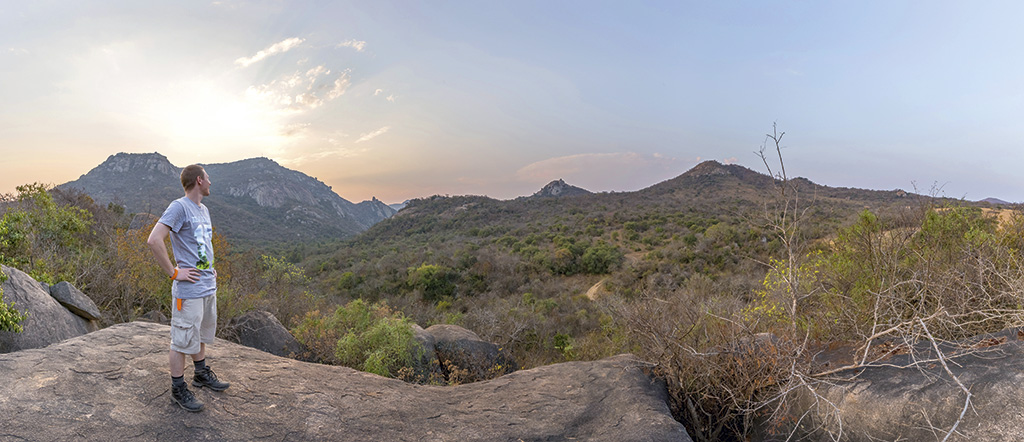
Brother-in-law Jarryd Finkelstein takes in the view from the gorgeous boulder-ringed braai area above Fig Tree House. Image Credit: Chris Davies
Sometimes I come to love a place so much that when I leave it’s inconceivable that I’ll never be back. But then time passes and life goes on, and the return journey gets indefinitely delayed. After years of this, I finally realised that actual trips down memory lane don’t just happen. And so, after much planning, and nearly three decades, I finally returned to Kruger National Park with my family.
It was a fine winter’s morning as we left Joburg, driving into the sunrise towards the Crocodile River. My brother and his Italian girlfriend had flown in from Perugia, my aunt from the UK and the rest of us from Cape Town. It’s near impossible to get everyone together these days, and my mom was all smiles as I glanced round to the back seat. In the late 80s we’d all lived in the Kruger for a glorious six months; my late father was a freshwater zoologist studying the rivers. Though my sister and I had visited separately since, for my brother, aunt and mother it was their first time back.
Our initial stop was a wonderful treehouse in the Crocodile River Nature Reserve, a stone’s throw from Kruger, and we were soon settled in the cosy braai area, tucked between high boulders with superb Lowveld views. As the moon arced across the sky, we sat and reminisced late into the night. Soon we’d be driving north through the park itself, to a special date on the Luvuvhu River.
We’d once camped wild on the Luvuvhu for three wonderful weeks and I was eager to take my mom back to that memorable spot. hose six months in Kruger were an incredible privilege, especially for me – I was 10 at the time. We’d jump into an open bakkie, a park ranger behind the wheel, and stand up in the back once we’d left the main public roads. I doubt if, even then, it was strictly allowed, but we’d felt like kings of the bushveld with the wind in our hair. This time I made do with the window rolled down as we entered the park early the next morning.
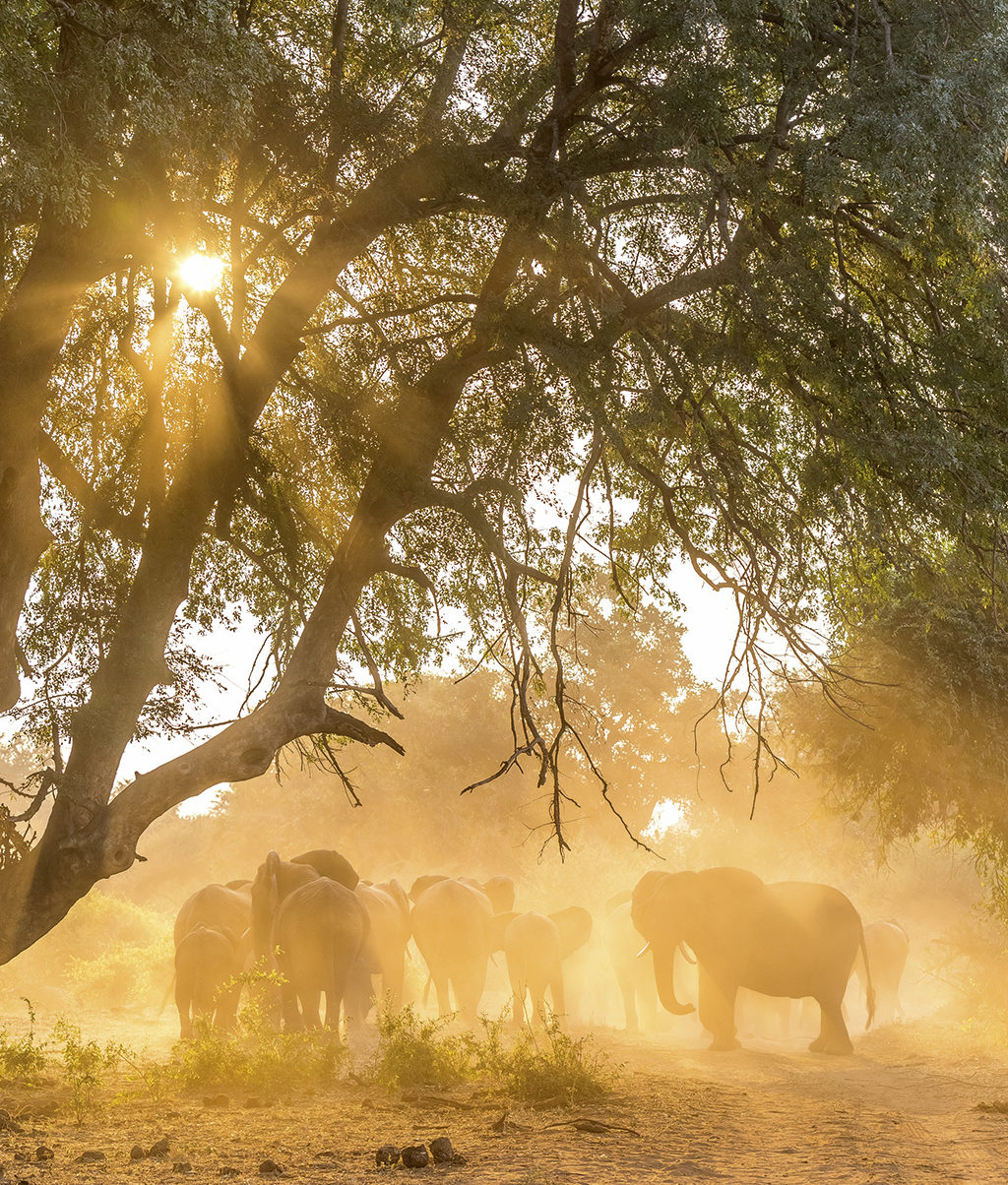
Elephants aglow in the afternoon light on the banks of the Luvuvhu River. Image Credit: Chris Davies
You can always tell a new arrival in Kruger – they’re the ones who pull over for every impala they see. That was us, as we inched like first-timers towards Skukuza, soaking in the moment and stopping for every warthog. As we finally drifted into camp the sun was silhouetting the marabou stork-studded trees. They stood sentinel along the road like the outline of a memory and it seemed they’d never left throughout the intervening years. kukuza’s rondavels also seemed barely to have changed, although the shop has had a revamp and the riverfront area too. Despite the new touches, there was that old, familiar feel; there’s something about Kruger’s rondavels that I hope never changes. They connect the present camps with my memories of the past, and although they’re now a bit frayed around the edges, I’d be happy if they stayed a feature for many years to come.
We crossed the Sabie River just after dawn the next morning, and two beautiful wild dogs joined us for a spell. They jogged along ahead of the car, then caught a scent and soon vanished between the trees. Later, at Orpen Dam viewpoint we watched a large matriarchal herd usher two tiny elephant calves down to the water to drink. A couple of cranky buffalo needed to be cleared out of the way first and there was a brief, noisy stand-off before mama elephant won the day. We stopped often that afternoon – though no longer for impalas – and gradually worked our way north. After two relaxing nights at Letaba and one more at Shingwedzi, the Luvuvhu River was calling. We’d soon be on foot.
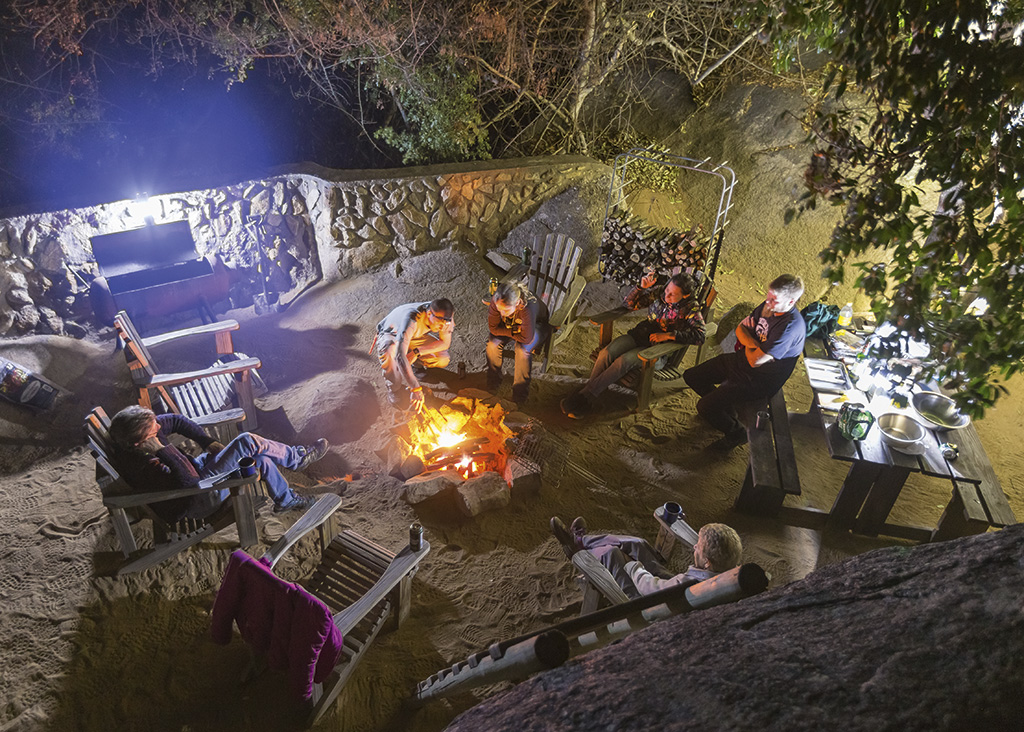
Fig Tree House’s cosy braai area was perfect for a family reunion. Image Credit: Chris Davies
In the far north of Kruger lies a region once called Pafuri – now this slice of land falls into the Makuleke Contractual Park. Back in the late 1980s Pafuri was part of Kruger, but although SANParks still plays a major role in conservation, tourism is now managed by the community. Working with them, Return Africa operates a walking safari camp, and as far as I could tell it was just a few hundred metres from where we’d once camped wild as a family. Our trails camp for the weekend would be much more plush this time around, but what better way to rekindle old memories than fenceless camping on the river? Our guides, Jonathan ‘Jono’ Turner and Eben Vermeulen, greeted us warmly, and we were soon unpacked. Later, as the afternoon sun filtered through the towering Natal mahogany trees, we set out on our first walk along the Luvuvhu’s sandy banks. ‘I think that old wild campsite was called Bobomene,’ whispered Jono as we gathered in the riverbed to watch herds of elephant come to drink. Hundreds were pouring down the banks to the water, and the evening light glowed yellow and gold through the dust.
Also read: Our top 7 campsites in the Kruger
‘Unfortunately, Bobomene was completely washed away when the river flooded in 2000, and again in 2013. All I can say,’ Jono pointed vaguely down the river, ‘is that it was somewhere over there, but the bank is completely changed.’ I squinted downriver and scanned the eroded banks, but nothing stood out under the violet, darkening sky. The elephants splashed and trumpeted and I found it didn’t really matter exactly where the old camp had been. Somewhere over there, my mom had taught me maths tables and I’d played with my brother, catching ant lions in the dust. Walking single file quietly back to camp, I glanced around and again saw my mother smiling. Behind her, my aunt was beaming widely too, and the grins continued on back down the line. These trips down memory lane, I thought, definitely don’t just happen, but if at all possible they’ll definitely be happening again very soon.

A highlight of Pafuri Walking Trails Camp is a sunrise stroll through the region’s stunning fever-tree forest. Image Credit: Chris Davies
Day by day
Day 1 & 2: Johannesburg to The Fig Tree House
Distance: 380km Allow: 5 Hours
Leave Joburg on the N12 east, then take the N4 to Nelspruit. About 20km east of Nelspruit, turn onto the Mara Road (D286). Sign in at the Crocodile River Nature Reserve gate, then it’s 14km along a twisting tar road, and left into the farm entrance at Daarbo Boerdery. It’s 3km of graded dirt to The Fig Tree House (1).
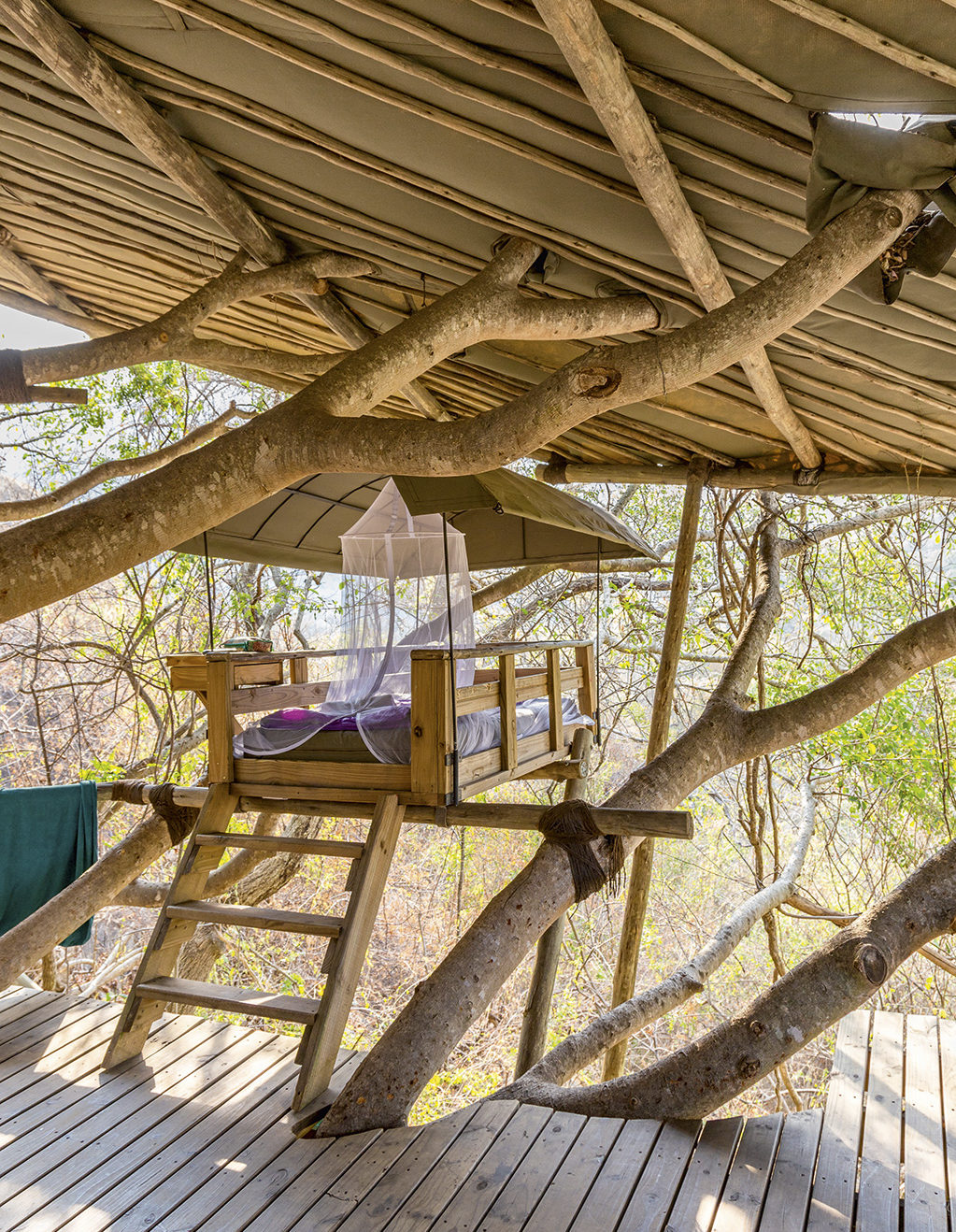
The Fig Tree House. Image Credit: Chris Davies
Day 3: The Fig Tree House to Skukuza
Distance: 100 km Allow: 6 hours
You can reach Skukuza Rest Camp (2) in under three hours, but leave early to maximise game-viewing time. From Fig Tree, take the D286 east and re-join the N4. From there it’s 20 minutes to Malelane Gate. There’s a SuperSpar en route if you need supplies. Once inside the park, the tarred H3 is the quickest road north, but check the sightings board at the gate and perhaps take a detour. Shady Afsaal picnic spot, with a small restaurant, shop and toilets, is an excellent place to break the journey.
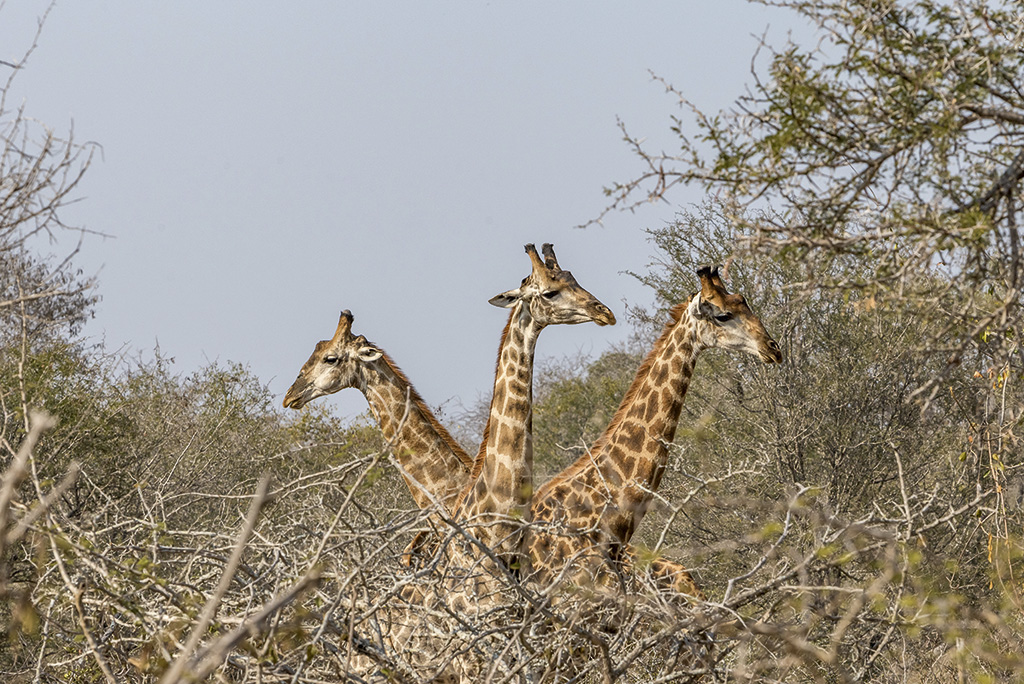
Image Credit: Chris Davies
Day 4, 5 & 6: Skukuza to Letaba to Shingwedzi
Distance 160km and 110km Allow 8 hours and 6 hours
The H1 from Skukuza to Letaba Rest Camp (3), bypassing Satara Rest Camp, takes three-and-a-half hours without stops, but much longer with game-viewing. Tshokwane picnic site and the Orpen Dam viewpoint make excellent mid-morning breaks. Tshokwane has a shop, toilets, restaurant and good coffee. Orpen Dam has no facilities but a great view. South of Letaba, Olifants Rest Camp has a restaurant and shop, and arguably the best viewing deck in Kruger. The Olifants River viewpoint is a 20-minute drive east and well worth the detour to see the confluence of the Olifants and Letaba rivers. From Letaba it’s two-and-a-half hours to Shingwedzi Rest Camp (4) but give yourself lots of time as there are often lions on this road. The Letaba River Bridge is a great place to stretch your legs, and there’s excellent afternoon game-viewing along the Shingwedzi River.
Day 7 & 8: Shingwedzi to Pafuri Walking Trails Camp
Distance 130km Allow 4 hours
Take the H1 north and, as check-in at Pafuri Walking Trails Camp (5) is from 2pm, there’s time for a detour to Punda Maria Rest Camp for lunch. From Pafuri Gate, it’s 650km back down the N1 to Joburg; count on nine hours with breaks and traffic.
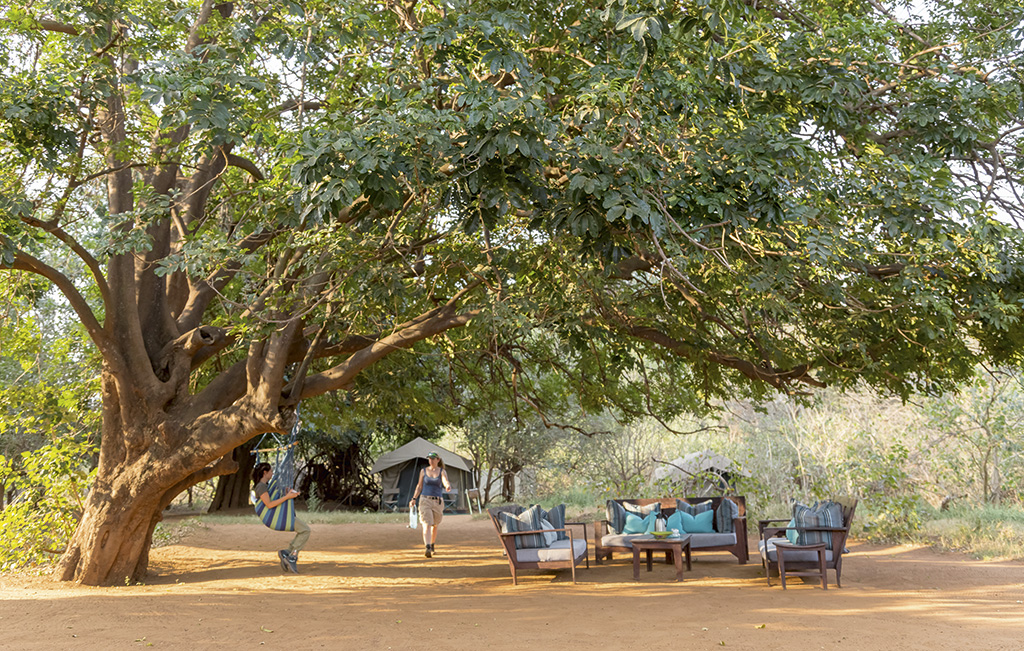
Pafuri Walking Trails Camp. Image Credit: Chris Davies
Directory
1. The Fig Tree House is a magical hideaway moulded around a giant wild fig. Ample firewood, crockery and drinking water is provided, but there’s no fridge so stop in Nelspruit to get ice. Also bring your own bedding and towels. R950 pp (sleeps six). Minimum two nights over weekends. 072-035-5685, thefigtreehouse.com
2. Skukuza Rest Camp has a range of accommodation, including an 85-stand campsite. Bungalows with private kitchens from R1 504 (sleep two); camping from R359 per stand (maximum six people).
3. Letaba Rest Camp‘s perimeter-view bungalows with private cooking facilities are worth paying a little extra for. The verandas look across lawns to the Letaba River, just visible through the trees. From R1 514 (sleeps two). The 60-stand campsite is away from the river. From R349 per stand (maximum six).
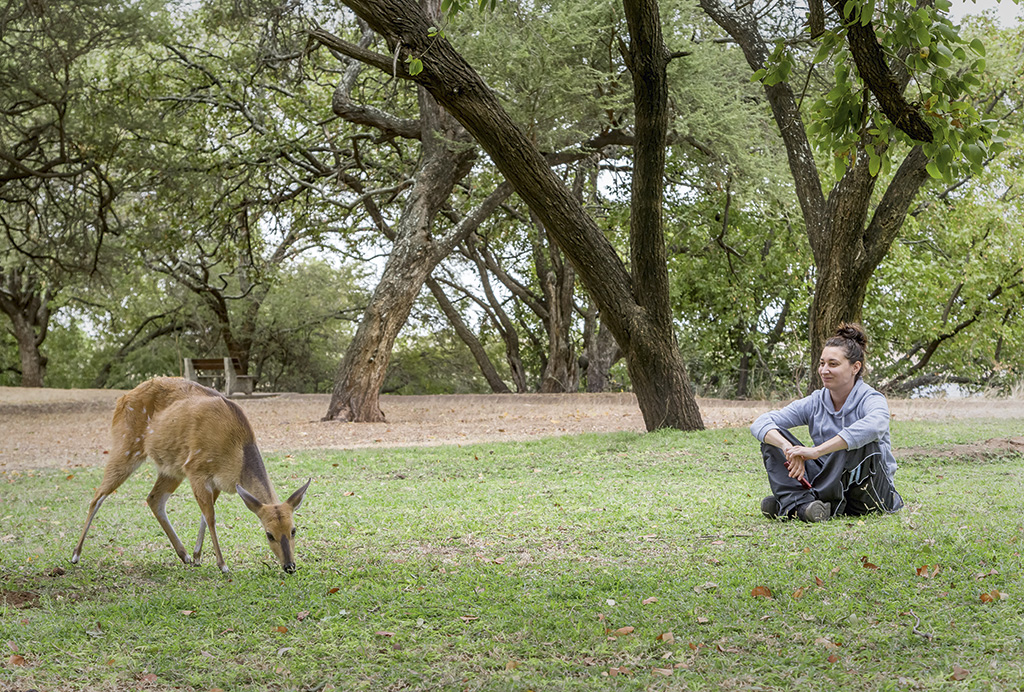
Letaba Rest Camp. Image Credit : Chris Davies
4. Shingwedzi Rest Camp has semi-detached bungalows arranged in two circles and a 65-stand campsite (book a site along the rear perimeter fence as the central stands are packed close together). Bungalows with private kitchens from R1 312 (sleep two); camping from R349 per stand (maximum six).
*Note There is a daily R93 conservation fee for overnight guests in Kruger (or use a Wild Card). Book all camps through central reservations. 012-428-9111, sanparks.org
5. Pafuri Walking Trails Camp lies on the northern banks of the Luvuvhu River and offers guided walks through one of Greater Kruger’s most beautiful riverine habitats. It’s open from April to October for a maximum of eight guests at a time; minimum two-night bookings. R2 860 pp, including all meals, snacks, selected beverages, game drives and two bush walks a day. There’s a once-off R165 pp concession fee plus the R93 daily conservation fee for Kruger. 011-646-1391, returnafrica.com

What It Cost
Eight nights, from Johannesburg, all-inclusive (conservation fees, wildcards, anti-malarials, fuel and tolls): R11,800 per person for two sharing in Kruger bungalows; R9,700 per person for two sharing Kruger camping; R8,100 per person for six sharing Kruger camping.

Makuleke Contractual Park. Image Credit: Chris Davies
You may also like
Related Posts
The Northern Cape landscape and its characters are full of life. Here are some of...
read more
If you're feeling a bit tired of the usual scene, take a tip from urban...
read more
The east coast is our very own tropical paradise with warm waters and laid-back vibes....
read more